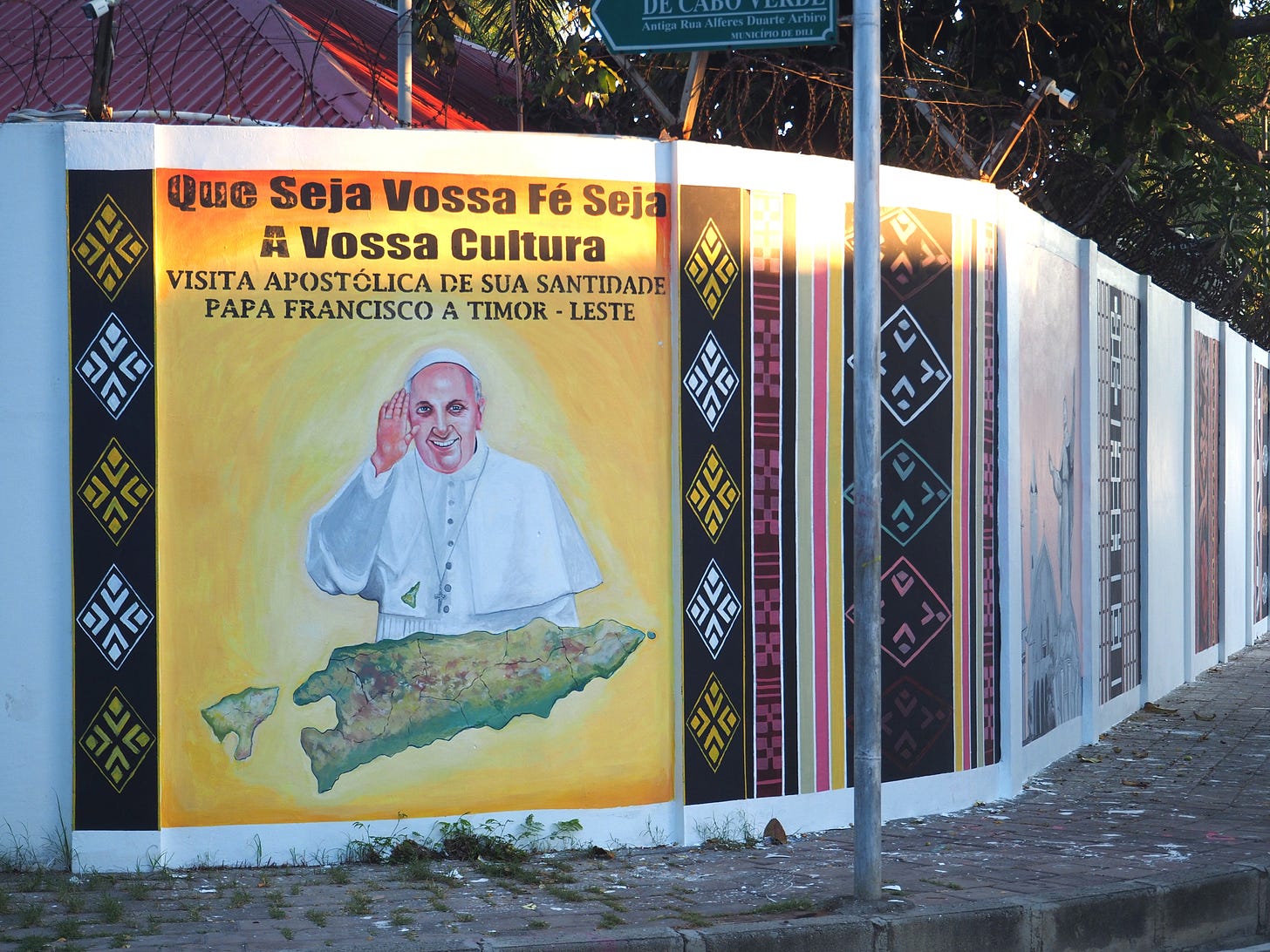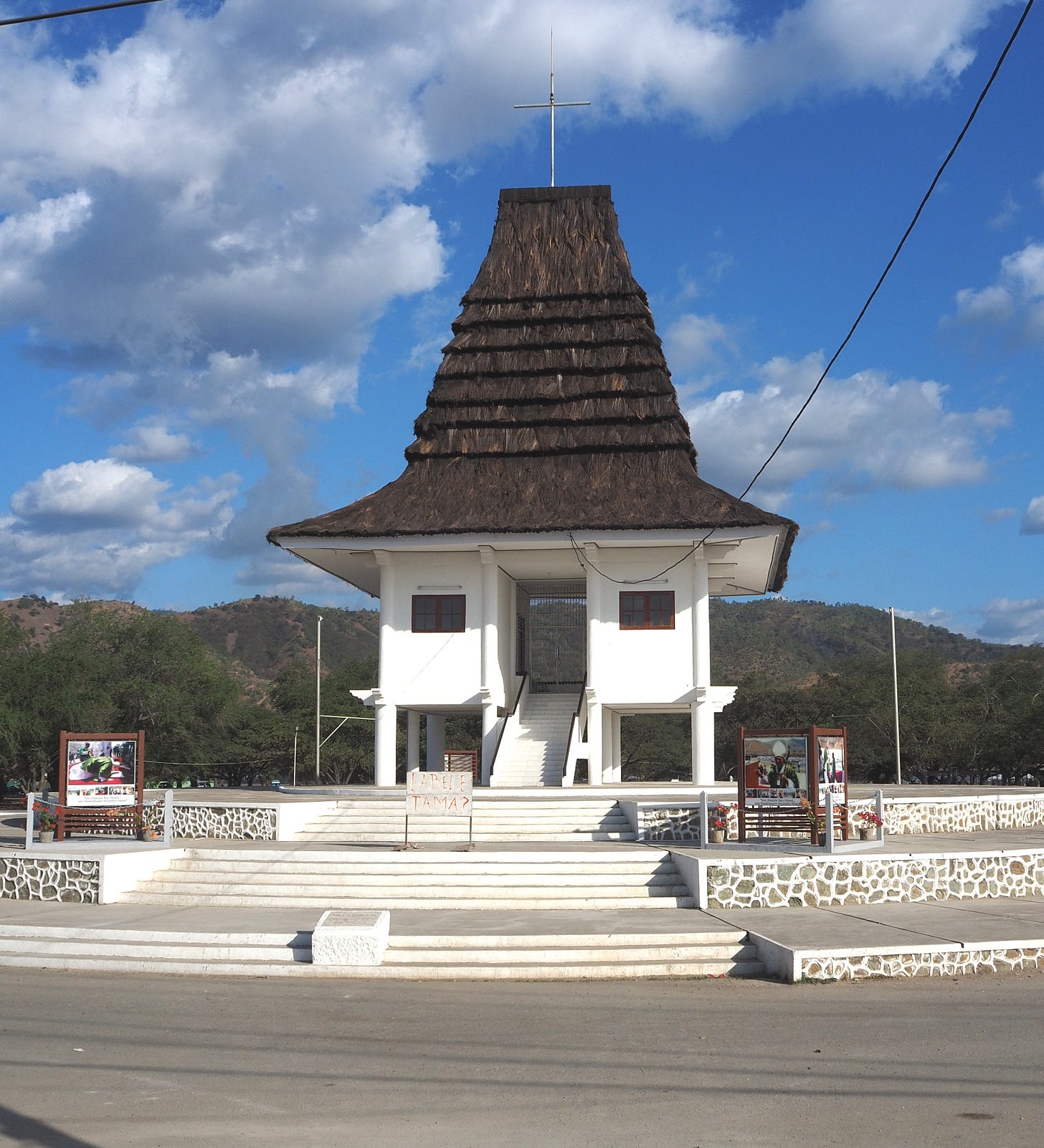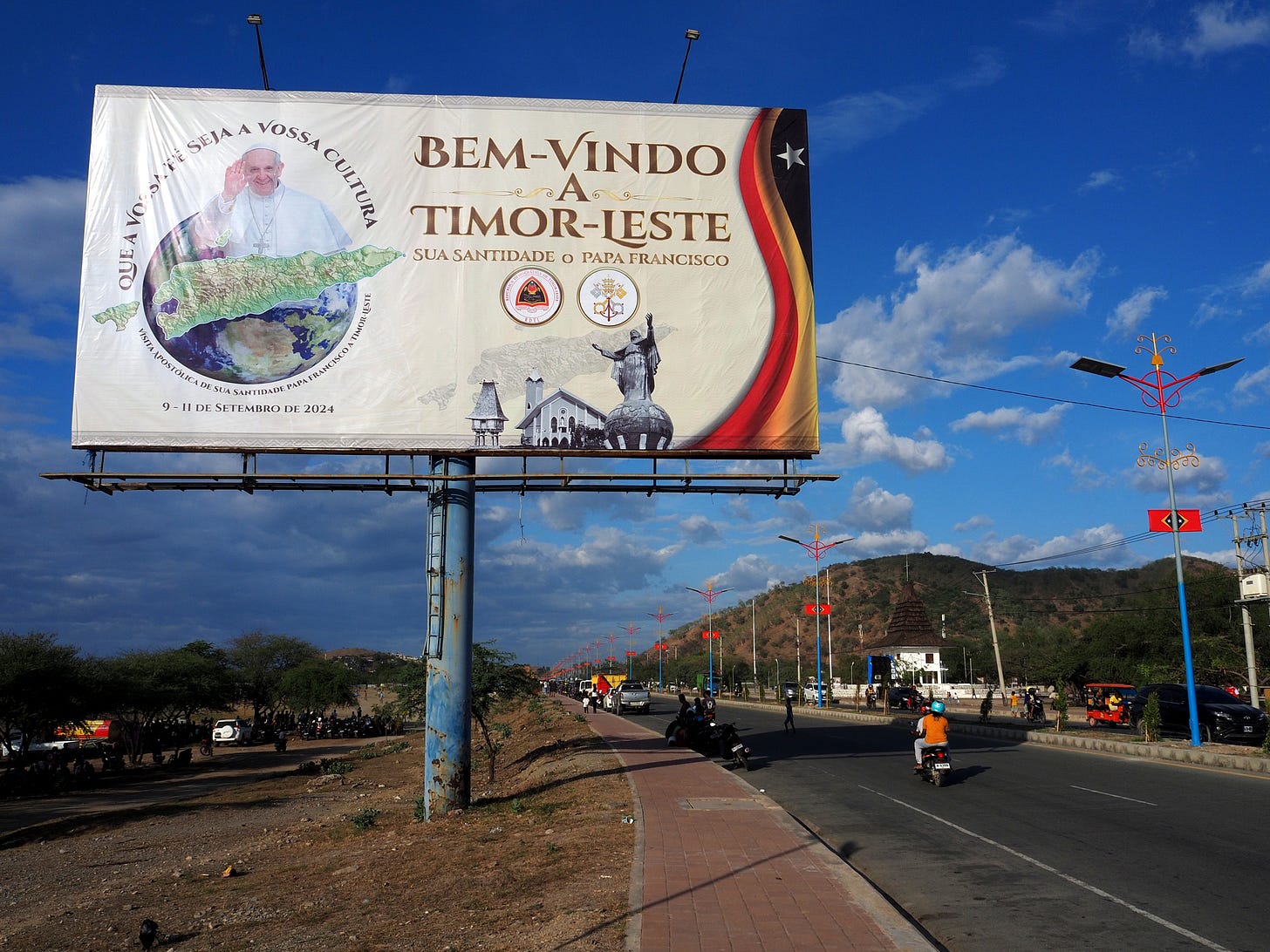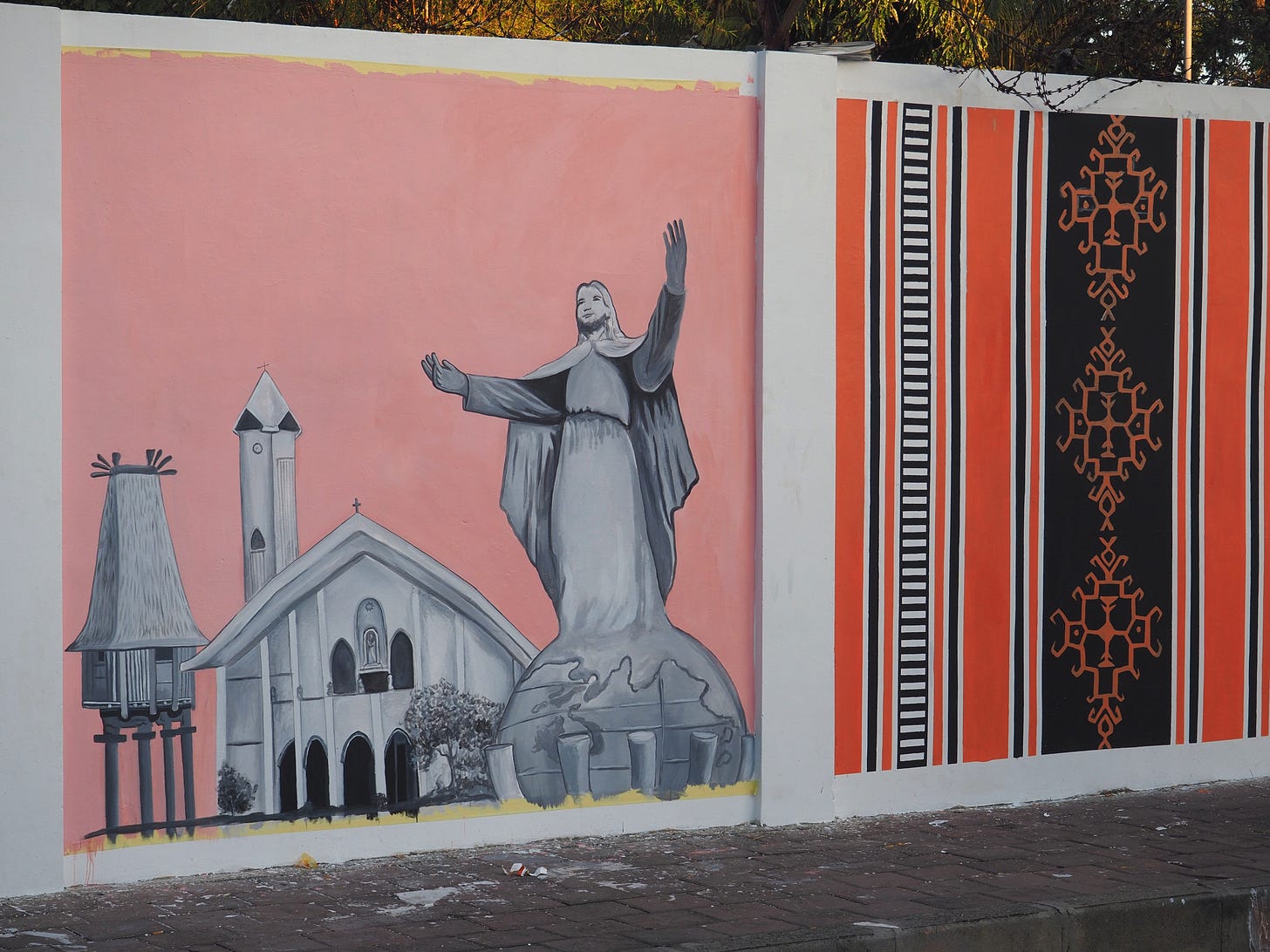Crowds? Taylor-Swift Ain't Got Nothing on our Most Venerable of Celebs
The Pope Is Visiting Timor-Leste, and it's very, very exciting.
With all the buzz around Taylor-Swift's eras tour, and American politicos and their less melodious rallies, you may have missed the news that here in Timor-Leste we are awaiting a gathering that promises to put their paltry crowds in the shade.
Yes, the heir of St Peter is coming to town, and it is to be an event of mind-boggling scale. The population of Dili (about 350,000) is predicted to double as people pour in for the Papal mass from rural districts1, as well as much of Eastern Indonesia. The predicted numbers are vast, a crowd so large that even Donald Trump would find it hard to exaggerate its size.
Which is certainly exciting, but even in the world’s most developed nations an event on this scale brings certain anxieties, and in the case of Timor-Leste there is reason to wonder how the country’s infra-structure will cope.
For Helen and myself though, the big question was about how we would cope: You see the Holy Father, plus his collection of minders, advisers and cardinals, will all be staying in Church premises not 500m from our modest house.
Papa Francisco (Pope Francis as he's known to Anglos) will only be here for three days, but in this fervently Catholic country2, people are determined to let him know his visit is appreciated. Roads are being hurriedly repaired and upgraded, trees pruned, fences re-painted, and churches refurbished. Gangs of (for the most part willing) volunteers are busy collecting rubbish on local beaches (I even saw a group of kids from the local mosque school being pressed by their teachers into this activity, which I thought gratifyingly inter-faith).
Huge signs of welcome already adorn all the main roads. Beyond that, even miles from anywhere the holy feet will tread, other signs, even beautifully hand-painted murals, have sprung up proclaiming, for instance, the happiness that the Timor Construction and Concrete company feels because Pope Francis is honouring the country with his presence.

Not all observers view this feverish activity as totally positive. Aside from the usual concerns about too much money being spent on the visit3, the government is accused of taking the opportunity to forcibly clear out a number of roadside slum dwellers (not, one would think, an activity approved of by a Pope who styled himself after St Francis). Moreover a rather quaint UN sponsored recycling project on Dili beach is being bulldozed - featuring brightly painted seats made of old tyres and discarded plastic bottles, much of the population would gather there to chomp grilled corn or chicken while viewing the sunset. (I’m unsure why the bulldozing was considered necessary: Perhaps the Pope is suspected of not supporting recycling, or maybe some bureaucrat thought his holiness's aesthetic sensibilities would be challenged by pink truck tyres?)
Meanwhile preparations are being made to manage the actual event, some sensible, some seemingly a bit ad hoc.
The Pope’s large entourage requires three planes, and since Dili’s airport lacks big hangers, these will have to sit on the runway. For this reason, and for security, the nation’s only international airport will be totally closed for at least three days. (His holiness' bullet-proof "Pope-mobile" will arrive separately, as it requires a heavy-duty aeroplane too large for Dili's runway. It will fly into airport in Baucau, a town on the Eastern end of the island, whereupon it will drive West to rendezvous with the papal party. Many people who cannot get into Dili to see the Pope, will at least get a chance to wave at his holy car).
Not just the airport will be closed however, as the government plans to block all roads leading into the city, making entrance contingent on a sort of barcoded bracelet issued by local Bishoprics (thousands have already queued for hours to get these). Once at the city limits, the eligibly barcoded pilgrims will be herded into three vast camps set up on the city outskirts. There, hopefully, tents, water and portaloos will be provided. Hopefully too, God's grace will ensure the dry season, nearing its end, extends long enough to save the huddled masses from tropical downpours. (Many of the faithful though, may arrive early to avoid security-checks and camp on relatives floor, while others will trek over ungaurded hills, so the system is not watertight).
Inside the city itself, when the Pope is reunited with his transport, he will be spared Dili's usual chaotic traffic, as all vehicles are going to be banned from the city’s main streets for the duration of the visit.
These arrangements, while perhaps lessening the crowd chaos, and making it easier for the Holy Father to wave blessings from his Pope-mobile, do mean that many residents of Dili and the newly set-up camps, will have to do a lot of walking to get even a faint glimpse of the holy celeb.

Even today, ten days from the main event, soldiers and police armed with automatic rifles are regularly blocking off peak hour traffic, and checking ID’s, as they practice security and traffic arrangements to protect his holiness from terrorists, or more likely, from being overwhelmed by the attentions of the over-zealous faithful.
And — as noted earlier — our house is right at the epicentre of all the planned activity. Between crowds and soldiers then, there is a good chance we could be unable to get out of our driveway for a week if we stick around.
This issue has been exercising not just our minds, but those of every person responsible for the safety of expats, foreign volunteers, UN staff and Aid workers (of which there are quite a few in Dili).
The problem, for both NGO’s and the government though, is that prediction is really hard. No-one has any good idea of what might happen – how many, and what kind of people will actually turn up for the visit. It will be large for certain, but will it be merely a big, well-behaved crowd, or will it be an overwhelming gigantic, unorganised, horde?
If all goes well, it could well be simply a wonderful and uplifting event. Timorese have an amazing capacity to pull some sort of order out of chaos, and they are much more patient than Westerners about enduring queues and inadequate infrastructure. Sensibly, local authorities are setting up screens in all small townships around the country, and encouraging the elderly in particular to watch the event in the comfort of their local village. It may be that many sensible folk will choose this option rather than hiking to Dili, and the big Mass will be merely huge, rather than super-gigantic.
But to consider the dystopian alternative, imagine a swarming mass of people, from toddlers to elderly, marching many kilometres to the main event, in tropical heat - all of them trying desperately to achieve a glimpse of the Pope, while being herded around by police and soldiers that haven't had much training in crowd control. Picture too these tired pilgrims staying before and after the event in dusty makeshift camps or packing themselves onto relatives’ floors, and you can begin to see why some in authority worry about the potential for food and water shortages, disease outbreaks, mass tramplings and so forth.
Add to this somewhat medieval picture of a religious pilgrimage, the more modern difficulties likely to be caused when everybody in the city simultaneously tries to upload selfies and pope visit pics. The country's internet , rudimentary at the best of times, seems very likely to be overloaded. Electricity, sewage, ATM and telephone systems are similarly vulnerable.
In considering the uplifiting versus dystopian possibilities though — for reasons of morality, past experience and insurance liability — humanitarian NGO’s tend to feel obliged to give more weight to the negative side of the equation.
Our organisation, Volunteer Services Abroad (VSA), therefore duly advised us not only that we couldn’t stay in our house for the big event, but that we are also not to attend the big mass iself! They were fearful of trying to evacuate us from among the crowds in the event of things turning to custard (Cholera outbreaks, heart attacks and possible political actions by disgruntled West Papuan separatists were cited as examples of what could befall us if we stayed put).
But although it was quickly decided we had to leave, it took rather longer to decide exactly where we should go.
Australian volunteers in Dili are being told to simply stock up food and water and hunker down in their individual houses for the duration.
VSA though takes its duty of care very seriously, and they have, after all, 60 years of experience of volunteers facing disaster situations. Many of these though, have involved devastating cyclones, in small Pacific Island nations.
The plan they came up with seems to reflect this background. When a cyclone is predicted you see, the very best thing to do is to gather your volunteers into one place as remote as possible from danger, where they can support each others and, if necessary, be evacuated all in one go. It was finally decided therefore, that all the volunteers should head in the opposite direction to the Popemobile, and be put up in a group in Baucau, on the east of the island, far away from the winds of the Vatican cyclone.
Which is very nice of VSA, and I’m sure everyone who goes will enjoy this unexpected break in their assignment (although, to make sure nobody gets lost, VSA has imposed strict limits on how far anyone can go from Baucau town).
Helen and I though, will not be among them, having already decided that if we couldn't be in Dili for the big event, we'd bloody well leave the country!
Friends in Bali have come to our rescue (thanks Farquhar & Lily!), offering us refuge. So, at best we'll only be able to watch it unfold on Television. Which is likely be more comfortable, if less exciting.
Still, it's been a treat to just watch all the preparations, and for the sake of our Timorese friends, I fervently hope it all goes well, and is fun and uplifting rather than dystopian.
I hope too, that Pope Francis will get a few minutes off to walk across the road from Vatican's (freshly painted) beachfront Embassy to dip his feet in the sea and gaze across the rubbish-free shoreline at the beautiful Dili sunset. It's a bit sad though, that if he does, he won't have a recycled tyre seat to recline on.
The Pope will preach to the faithful from a huge replica of a "Uma Adat" or traditional animist spirit house! This reflects the fact that even today the animist reverence for ancestors and belief in local spirits remains strong among Timorese, existing as a layer just below their overt Catholicism. (See also footnote below).
As a bloke from a country where the biggest census category for religious affiliation is "no religion", I confess that I find all this frenzy a touch bemusing. But Timor-Leste is 97% Catholic, and most take their faith very seriously. Church services are packed, and colourful Saints-Day processions, with soulful singing, flags, candles, banners, and statues of a suffering Jesus or martyred saint, regularly block the roads. Many workplaces have a statue of the Virgin Mary at the entrance, which staff will touch at the beginning and end of the day, uttering a small prayer.
This Catholicism originated in the 500 years Timor-Leste spent as a Portuguese colony, but interstingly it got a boost from the Indonesian occupation (1975-2000). Before then many Timorese were unconverted animists. But the Indonesian's required citizens to be a member of a major religion: atheists and animists being regarded as nearly as evil as Communists. This, together with the Church’s activities in oppossing the worst of the occuppying military’s oppression, caused a bump in baptisms.
Certainly some local Timorese, and rather more ex-pats, decry the money 'wasted' on all this stuff, feeling it should be spent on improving child health or other pressing needs. It's a fair point, although I'm of the view that many countries make decisions on social ‘feel-good’ expenditure that can be similarly criticised - the amount of money spent by France on the Olympics, New Zealand on America Cups or the billions Americans blow on elections all come to mind. At least the newly asphalted roads in Dili will still be put to good use in forthcoming years.





